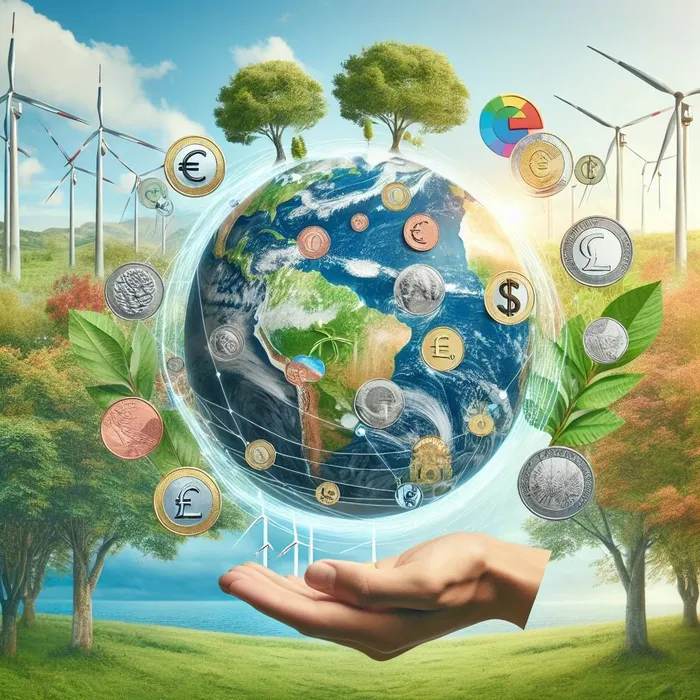
The G20 Leaders’ Summit and COP30 together represent a unique moment for the Global South to redefine the trajectory of international climate action, say the authors.
Image: AI Lab
Last week, on the 29th of October 2025, young climate leaders, policymakers, and negotiators gathered at the COP30 Youth Dialogue hosted by the Local Conference of Youth (LCOY) South Africa 2025, supported by the Presidential Climate Commission (PCC) and funded by the European Union.
The event, themed “Towards a Compact for the Future: Solidarity, Sustainability and Equality,” could not have come at a more critical moment. With South Africa preparing to host the 2025 G20 Leaders’ Summit and Brazil (and the rest of the world) gearing up for COP30, the conversation turned to the central issue that has haunted global climate politics for decades: money.
In the 1996 film Jerry Maguire, a desperate sports agent is confronted by his client’s now-iconic demand: “Show me the money.” The phrase, though simple, captures the heart of what developing nations are now saying to the world’s wealthiest economies. For countries in the Global South, the climate crisis is not an abstract future threat, it is a daily reality eroding livelihoods, stability, and hope. Yet the funds needed to respond remain out of reach. The moral and material weight of this shortfall is enormous. To meet their national climate plans and adaptation needs, developing nations collectively require between five and seven trillion dollars by 2030. But the flow of climate finance remains painfully insufficient, slow, and inequitable.
At the recent national youth dialogue on COP30, the tension between urgency and slow global action was unmistakable. The keynote address underscored that the world remains dangerously off-track from the 1.5°C goal, while a detailed briefing on South Africa’s negotiation priorities provided a clear and sobering picture of what is at stake. Youth voices reminded the room that intergenerational justice is impossible without meaningful participation in climate decision-making. Further contributions from those working on gender-responsive climate action, youth just transition negotiations, and youth-led research—made it clear that solidarity, sustainability, and equality cannot remain aspirational slogans; they must translate into concrete, systemic shifts in how climate finance is conceptualised, delivered, and monitored.
The coming months will test whether the world is capable of such a shift. The G20 Leaders’ Summit and COP30 together represent a unique moment for the Global South to redefine the trajectory of international climate action. The G20, which accounts for over 85 percent of the world’s GDP, has the responsibility to consider urgent funding needs of developing countries for the just transition. COP30 must also prioritise how that capital is mobilised, distributed, and accounted for.
The reality is that the current architecture of climate finance is broken. Despite a growing recognition of the climate emergency, finance continues to flow disproportionately to mitigation projects in wealthier nations, while adaptation which is the lifeline for vulnerable communities remains severely underfunded. Much of the financing that does reach developing countries comes in the form of loans, deepening debt burdens rather than relieving them. If this system is to serve the purpose it was built for, it must be restructured around justice, not charity. That means ensuring predictability, accessibility, and accountability in the flow of funds and embedding equity and inclusion into the design of financial instruments and climate commitments alike.
South Africa’s dual role as both a developing nation and host of the G20 places it in a pivotal position. Domestically, it faces the challenge of implementing its Nationally Determined Contribution (NDC) in a way that ensures a fair and youth-inclusive transition. Internationally, it carries the responsibility of translating G20 commitments into negotiating leverage at COP30, especially on the issues of finance and transparency. The success of South Africa’s presidency will depend on whether it can transform the G20 from a forum of rhetoric into a mechanism of delivery. One that not only commits to scaling up climate finance but also aligns that finance with social and developmental priorities across the Global South.
The conversation must also recognise that solidarity cannot be divorced from inclusion. At the heart of the climate movement are young people whose futures are most at stake. For climate finance to be effective and just, it must fund youth-led solutions, support skills development, and create pathways for meaningful participation in both national and global decision-making.
For decades, promises have been made to the world’s most vulnerable countries, and yet the money, the real, transformative capital, has not materialised at the scale required. The G20 Summit and COP30 will test whether the global community is capable of moving beyond incrementalism toward genuine solidarity.
G20 and COP30 combined have the potential to greatly advance the funding needs of developing countries. Together they can set a new precedent for global cooperation. Rooted in fairness, accountability, and shared prosperity. But time is not on our side. The world cannot continue to pledge billions while delaying trillions. As climate impacts accelerate and inequality deepens, the call from the Global South grows louder and clearer. It is no longer enough to promise.
It is time to show us the money.

Londiwe Buthelezi is a member of the PCC’s Youth Caucus and a member of LCOY.
Image: Supplied

Puleng Sidzumo is a member of the PCC’s Youth Caucus and member of LCOY.
Image: Supplied
Puleng Sidzumo and Londiwe Buthelezi, are members of the PCC’s Youth Caucus and members of LCOY.
*** The views expressed here do not necessarily represent those of Independent Media or IOL.
BUSINESS REPORT